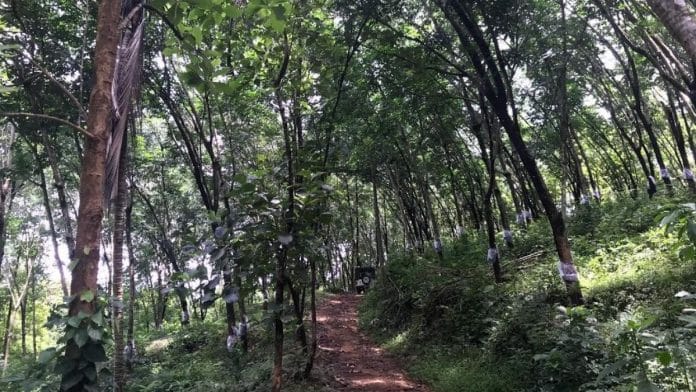Kottayam: For 25 years, K.L. Nandakumar managed a rubber plantation on the one-acre land he owns at Tirumala near Thiruvananthapuram. But three years ago, when it was time to replace his rubber trees with saplings, he decided against it.
Instead, the small scale farmer has planted 350 plantains on his land. “The low prices for rubber as well as the lack of rubber tappers has forced us to cut down the trees,” Nandakumar told The Print.
He is among a growing number of rubber farmers in Kerala who are being forced to look for alternative crops due to a drastic drop in prices. Rubber was once the state’s prime cash crop but over the past decade, prices have plunged.
Experts say that long-term problems such as the central government refusing to increase import duty on rubber, lack of government help, cartelisation by tyre manufacturers and recent issues such as the Covid-19 lockdown and the stagnant economy have left the sector in a massive crisis.
That has disproportionately affected farmers in Kerala, who account for bulk of the rubber production in the country.
Experts such as former Rubber Board chairman P.C. Cyriac are now imploring rubber farmers to switch over to other crops.
Also read: Kerala minister Jaleel faces Customs probe for receiving food & Quran copies from UAE
Kerala’s rubber conundrum
Rubber prices have been nose-diving in the past 10 years.
According to the Rubber Board statistics, the price of RSS 4 grade rubber has fallen from a high of Rs 20,805 a quintal in 2011-12 to Rs 12,595 a quintal in 2018-19. In between, it had dropped to a low of Rs 11,306 in 2015-16.
This has affected farmers in Kerala the most.
According to the statistics with the Rubber Board, which falls under the Ministry of Commerce and Industry, of the 8.22 lakh hectares of rubber plantations in the country, Kerala and Kanyakumari in Tamil Nadu account for 70 per cent of them.
The data also points to the growing crisis. Of the 6.64 lakh hectares of rubber, which can be tapped this fiscal year, only 4.88 lakh hectares have been tapped. The remaining 1.76 lakh hectares of rubber is lying untapped due to a number of reasons — lack of tappers, the price drop, a stagnant market and the increasing cost of production.
That has left over 10 lakh rubber growers in Kerala grappling with a crisis.
If that wasn’t enough, tonnes of rubber are lying stagnant in the Kerala market owing to rubber companies not buying them.
Rubber Board Executive Director Dr K.N. Raghavan said the board has now come up with some measures and recommendations to help the plantation owners — chief among them being a reduction in production costs.
“We have also started urging farmers to depend on the ‘Rubber Tappers Bank’ for the services of tappers. The tappers bank is formed in association with the rubber production societies (RPS). The farmers can approach the bank and avail the services of tappers,” he told ThePrint. “As part of this, the tapper registered with every RPS will visit the plantations by turn, once a week. Thus tapping can be reduced to once in a week. The remuneration of the tapper could be given by the societies or the plantation owner themselves. Thus the financial burden in maintaining a tapper can be minimised.”
Also read: Why Kerala is planning to allow its famed plantations to grow exotic fruits
Low import duty, ‘lack of government support’
Rubber Board ex-chairman Cyriac said domestic production has been affected by the import of rubber. He said the central government has the authority to increase import duty, in line with the World Trade Agreement, but it hasn’t done so.
In the past few years, Cyriac added, the annual aggregate import of rubber has increased from 75,000 tonne to 5 lakh tonne.
Dr Raghavan, however, said the domestic production of rubber has not been at par with the demands of the market in recent years. According to the Rubber Board statistics for 2019-20, the local production of rubber was 7.12 lakh tonne whereas the demand in the market is 11.34 lakh tonne. In 2018-19, the domestic production was 6.51 lakh tonne whereas the demand was 12.11 lakh tonne.
With such disparity, Raghavan said, it would be impractical to impose a higher import duty.
Chandrasekaran Nair, a rubber grower, said setting a minimum support price for rubber at Rs 258 per kilo could solve the situation. The Rubber Board had in 2016 declared that the production cost of 1 kilo of rubber was Rs 172. Nair said the figure of Rs 258 is taking into account a 50 per cent profit on the production cost.
Raghavan said the Rubber Board has proposed to the commerce ministry to provide a package of Rs 170 crore to rubber farmers and tappers but is yet to receive a response. He added that a proposal for a minimum support price was tabled in 2019 but there is no movement on that front as well.
Kerala Congress leader P.C. Thomas, a former central minister and six-time MP, blamed manufacturers for the crisis. “The manufacturers always try to establish that there is inadequate domestic rubber. The All India Tyre Manufacturers Association (AATMA) always influences the central government to keep the prices of the rubber down,” he said. “The imposing of import duty cannot alone help revive the sector. The beginning of the new value-added products is equally important to revive the sector.”
He said the development of a new market can help revive the industry and shatter the monopoly of the tyre companies in the purchase of rubber. “The farmers of the state should also be equipped to export their rubber to foreign markets. Export of the rubber has very big scope, which the tyre lobby is trying to hinder.”
Also read: Mother was Covid-free when she died — MP Alphons after row over her ‘public funeral’ in Kerala






